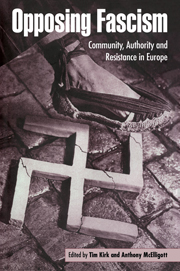Book contents
- Frontmatter
- Contents
- List of contributors
- Preface
- Introduction: Community, authority and resistance to fascism
- 1 The German revolution defeated and fascism deferred: the servicemen's revolt and social democracy at the end of the First World War, 1918–1920
- 2 Dangerous communities and conservative authority: the judiciary, Nazis and rough people, 1932–1933
- 3 The anti-fascist movement in south-east Lancashire, 1933–1940: the divergent experiences of Manchester and Nelson
- 4 Spain 1936. Resistance and revolution: the flaws in the Front
- 5 The Blueshirts in the Irish Free State, 1932–1935: the nature of socialist republican and governmental opposition
- 6 Town councils of the Nord and Pas-de-Calais region: local power, French power, German power
- 7 Structures of authority in the Greek resistance, 1941–1944
- 8 Nazi Austria: the limits of dissent
- 9 ‘Homosexual’ men in Vienna, 1938
- 10 ‘The years of consent’? Popular attitudes and forms of resistance to Fascism in Italy, 1925–1940
- 11 Saints and heroines: rewriting the history of Italian women in the Resistance
- Notes
- Index
5 - The Blueshirts in the Irish Free State, 1932–1935: the nature of socialist republican and governmental opposition
Published online by Cambridge University Press: 28 July 2009
- Frontmatter
- Contents
- List of contributors
- Preface
- Introduction: Community, authority and resistance to fascism
- 1 The German revolution defeated and fascism deferred: the servicemen's revolt and social democracy at the end of the First World War, 1918–1920
- 2 Dangerous communities and conservative authority: the judiciary, Nazis and rough people, 1932–1933
- 3 The anti-fascist movement in south-east Lancashire, 1933–1940: the divergent experiences of Manchester and Nelson
- 4 Spain 1936. Resistance and revolution: the flaws in the Front
- 5 The Blueshirts in the Irish Free State, 1932–1935: the nature of socialist republican and governmental opposition
- 6 Town councils of the Nord and Pas-de-Calais region: local power, French power, German power
- 7 Structures of authority in the Greek resistance, 1941–1944
- 8 Nazi Austria: the limits of dissent
- 9 ‘Homosexual’ men in Vienna, 1938
- 10 ‘The years of consent’? Popular attitudes and forms of resistance to Fascism in Italy, 1925–1940
- 11 Saints and heroines: rewriting the history of Italian women in the Resistance
- Notes
- Index
Summary
The popular historical mind in Ireland has firmly identified the Blueshirts as the embodiment of the Free State's experiment with fascism. In February 1932 when the Army Comrades Association was formed (the Blueshirts had four ‘official’ titles: name changes were prompted by internal reorganisation or government bans), only the Irish Independent saw fit to give notice of the event. The period from 1932 to 1935 transformed the Blueshirts from their origins as a fledgling ex-service-men's organisation into a major force in Free State politics; and one which challenged the authority of de Valera's Fianna Fail government, and caused such violent opposition from socialist republican forces that some observers feared a return to the animosity of the civil war of 1922 and 1923.
From the foundation of the Irish Free State in 1922 until the general election of 1932, the victors of the civil war, the pro-Treaty party Cumann na nGaedheal, had dominated Irish politics. This was due not only to electoral victory, but also because of the abstentionist line taken by Eamonn de Valera's Sinn Fein. In 1927, following the murder of the defence minister, Kevin O'Higgins, by members of the Irish Republican Army (IRA), the attendance of Sinn Fein in the Dail was demanded by the prime minister W. T. Cosgrave.
- Type
- Chapter
- Information
- Opposing FascismCommunity, Authority and Resistance in Europe, pp. 80 - 96Publisher: Cambridge University PressPrint publication year: 1999



